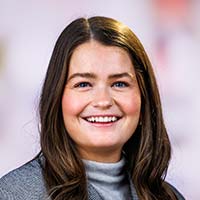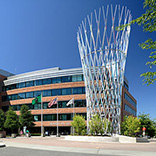Fred Hutch offers a wide range of training opportunities for graduate students, including a University of Washington (UW)/Fred Hutch jointly administered PhD program in Molecular and Cellular Biology (MCB). Many Fred Hutch faculty members serve as training faculty for UW Departmental programs in Molecular Medicine and Mechanisms of Disease (M3D), Genome Sciences, Microbiology, Global Health, Epidemiology and Biostatistics as well as other programs.
Students also can participate in dual degree graduate programs, including the UW Medical Scientist Training Program (MSTP) leading to an MD/PhD degree, as well as a unique program leading to a PhD in MCB and an MS in Epidemiology. There are currently over one hundred PhD students training in laboratories and research programs at Fred Hutch with access to 10 training grants led by Fred Hutch faculty to help support graduate student training.

Molecular and Cellular Biology Graduate Program (MCB)
This is an interdisciplinary program of graduate studies leading to a Ph.D. degree. Approximately 190 faculty from Fred Hutch and the University of Washington participate in the program. Many areas of structural, molecular, cellular, and developmental biology are represented. MCB students tailor their education to meet their scientific and career goals.

Medical Scientist Training Program (MSTP)
This is one of the top dual-degree M.D./Ph.D. programs in the country. Founded in 1964, the UW MSTP offers outstanding training for highly academically qualified students who are seeking to combine clinical medicine with biomedical research.
Other Graduate Departments and Programs
Many faculty members at Fred Hutch have affiliate appointments in departments at the University of Washington. In most cases, students accepted into a UW graduate program in a department where Hutch faculty are affiliated, can choose to follow graduate research in the laboratory of the affiliate at the Hutch.

Weeks 1 - 5
Location: Weintraub Building, B-Suite Teaching Lab (B1-076 only)
Meeting Time: Tuesdays and Thursdays, 1:30 PM to 2:50 PM
Instructors: Jihong Bai
Course Description: A crucial part of a scientific career is the ability to effectively deliver a research seminar. This course will focus on all aspects of giving a seminar and teach students how to introduce the research topic, how to make clear and effective slides, and how to explain methods and data in a clear manner. Students will prepare their own research seminar throughout the course. Each week they will practice a part of it and receive feedback from other students and the instructors. By the end of the course, students will have an entire seminar about their thesis project prepared. The course will also give examples of good and bad seminars and help students learn how to communicate with non-scientists about their research.
Please check the UW Time Schedule regularly for course availability and updates.
Weeks 1 - 5
Location: Weintraub Building, B-Suites (B1-072/074 only)
Meeting Time: Tuesdays and Thursdays, 3:20 PM to 4:50 PM
Instructors: Barry Stoddard
Course Description: We will provide an overview of the general principles of protein structure, with a focus on modern methods used to determine and analyze protein structures. The goal of the course is to provide the non-specializing scientist the knowledge to critically read and understand protein structure papers from the primary literature, and to incorporate a structural molecular biology perspective into their own research. The course will assume a knowledge base equivalent to an advanced undergraduate biochemistry course, at the level of Stryer Biochemistry or Alberts Molecular Biology of the Cell.
Please check the UW Time Schedule regularly for course availability and updates.
Weeks 1 - 10
Location: Weintraub Building, B-Suites
Meeting Time: Mondays, 4:00 PM to 5:30 PM
Instructors: Julian Simon & Michael Lagunoff
Please check the UW Time Schedule regularly for course availability and updates.
For more information on a specific course, please click on the link under the title.
Course | Course Title | Credits | Quarter |
MCB 512 | How To Give A Scientific Seminar | 1.5 | Winter 2025 |
MCB 515 | Molecular and Cellular Biology Literature Review | 2.0 | Winter 2025 |
MCB 516 | Molecular and Cellular Biology Grant Writing | 2.0 | Spring 2025 |
MCB 517 | Epigenetics and Epigenomics | 1.5 | Autumn 2024 |
MCB 536 | Tools for Computational Biology | 1.5 | Autumn 2024 |
MCB 522 | Developmental Basis of Human Disease | 3.0 | Winter 2024 |
MCB 529 | Mechanisms of Cell Migration | 1.5 | Winter 2024 |
MCB 532 | Human Pathogenic Viruses | 3.0 | Autumn 2023 |
MCB 539 | Biological Basis Of Neoplasia | 3.0 | Spring 2024 |
CONJ 537 | Mechanisms of Transcriptional Regulations | 1.5 | Autumn 2024 |
CONJ 544 | Protein Structure, Modification, and Regulation | 1.5 | Winter 2025 Every Year Weeks 1-5 |
The transferability of credits earned at Fred Hutch is at the discretion of the receiving college, university, or other educational institution. Students considering transferring to any institution should not assume that credits earned in any program of study at Fred Hutch will be accepted by the receiving institution. Similarly, the ability of a degree, certificate, diploma or other academic credential earned at Fred Hutch to satisfy an admission requirement of another institution is at the discretion of the receiving institution. Accreditation does not guarantee credentials or credits earned at Fred Hutch will be accepted by or transferred to another institution. To minimize the risk of having to repeat coursework, students should contact the receiving institution in advance for evaluation and determination of transferability of credits and/or acceptability of degrees, diplomas, or certificates earned.
Washington State Achievement Council Degree-Granting Institutions Regulation - WAC 250-61
Degree-Granting Institutions Statute - RCW 28B.85
Big Data for Genomics and Neuroscience (T32)
New technologies such as DNA sequencing, fMRI imaging and high-throughput electrophysiological recording have led to the generation of very large data sets. However, in order to use these big data sets to improve scientific understanding and human health, there is a need for a new generation of scientists with interdisciplinary training that spans three areas: computer science, statistics, and biology. The BDGN Training Grant is an NIH funded program that provides training for students engaged in big data research in genomics and neuroscience at the University of Washington. The program draws students from Biology, Biostatistics, Genome Sciences, Neuroscience and Statistics.
Biobehavioral Cancer Control and prevention Training Grant (T32)
This training program provides formal coursework as well as research and intervention experience in cancer prevention and control. This program is funded by a Ruth L. Kirschstein NRSA Institutional Research Training Grant (T32) from the National Institute of Allergy and Infectious Diseases.
Cell and Molecular Biology Training Program (T32)
The goal of this National Research Service Award (NRSA) Predoctoral Institutional Training Program is to provide trainees with research opportunities of a cross-disciplinary nature at the molecular and cellular level in the PhD-degree-granting programs of five participating departments (Biochemistry, Genome Sciences, Immunology, Microbiology, Pharmacology) and two interdisciplinary programs (Molecular & Cellular Biology, Neuroscience).
Cancer Prevention Training: Epidemiology, Nutrition, Genetics & Survivorship (T32)
This award supports research training and projects in nutrition, genetics, metabolic pathways, and other lifestyle factors in relation to cancer prevention with an emphasis on survivorship. Trainees are provided with formal coursework in epidemiology, nutrition and genetics/human biology and with innovative and transdisciplinary research experiences. The program also ensures trainees gain the skills to prepare for an independent research career; including practice with grant writing, scientific manuscript preparation, oral presentations and long-term career development planning.
Developing Data-Driven Cancers Researcher (T32)
This NIH Training Grant provides support for students in the Departments of Biostatistics and Epidemiology at the University of Washington. This grant is funded by a Ruth L. Kirschstein NRSA Institutional Research Training Grant (T32) from the National Institute of Allergy and Infectious Diseases.
Experimental Pathology of Cardiovascular Disease (T32)
The Cardiovascular Pathology Training Program is devoted to the study of the molecular and cellular basis of cardiovascular disease. The extensive collaborative research of CVP faculty produces a synergistic effect in training as well as an important bridge between basic and clinical science with major foci of interest in growth control, developmental biology, adherence signaling and direct studies of vascular pathology in atherosclerosis and hypertension.
Genetic Approaches to Aging Research (T32)
The goal of our program is to train new independent investigators who will utilize molecular and genetic techniques to investigate the biology of aging. The objective of this research is to elucidate the basic mechanisms underlying the process of aging and age-related changes in humans and in animal models of human aging. This includes investigations of the mechanisms responsible for the gradual or programmed alterations of structure and function that characterize normal aging, as well as how these adverse changes become risk factors for, or accompany, age-related conditions and disease states.
Infectious Disease in the Immunocompromised Host (T32)
This program supports the next generation of physicians and scientists, currently MD or PhD, with expertise in infectious diseases in the immunocompromised host. Trainees are provided with a scientifically rigorous and culturally inclusive training environment to foster creative, innovative and collaborative research on infectious diseases in non-HIV immunocompromised patients (e.g. transplant, cancer, immunomodulatory therapy).
Interdisciplinary Training in Cancer Research (T32)
The aim of this program is to train young scientists to design and conduct research on significant problems in cancer by combining information and approaches from different scientific disciplines, including basic cellular and molecular biology, epidemiology, clinical trials and studies, and behavioral-social sciences.
Interdisciplinary Training in Genomic Science (T32)
The NIH/NHGRI Genome Training Grant prepares trainees for research careers in acquiring and interpreting genomic data and using this information in biomedical research. We recognize that this type of research will demand interdisciplinary approaches and multidisciplinary collaborations. One goal of this program is to attract individuals from the physical sciences and engineering to the forefront of modern biological research. The program also trains cellular and molecular biologists in other disciplines so that they can effectively collaborate at this interdisciplinary interface.
Joel Meyers Endowment Scholarship
This Scholarship provides critical bridging support for young physician-scientists (e.g. MD Senior Fellows) to launch careers as leaders in infectious disease research and patient care, with a focus on infections in immunocompromised patients.
STD/AIDS Research Training Fellowship Program (T32)
This NIH-supported training program's goal is to train the next generation of leaders in STD and AIDS research. Predoctoral trainees must be enrolled in doctoral programs at the University of Washington and must be working with a Program faculty member.
Training in Molecular Biophysics (T32)
The major goal of this program is to train students in molecular biophysics, the use of physical and quantitative approaches in the study of biomedically relevant systems. Students in the Training Program receive training beyond the standard graduate program through a bi-weekly student research presentation series, a student journal club/discussion group, an annual retreat that includes the trainees and their advisors, and through lectures supported by this program.
Viral Pathogenesis and Evolution Training Grant (T32)
The aim of this program is to support predoctoral trainees in the area of virology research. The program is funded by a Ruth L. Kirschstein NRSA Institutional Research Training Grant (T32) from the National Institute of Allergy and Infectious Diseases.
Research Ethics
All Hutch-based trainees (postdoctoral researchers, clinical fellows, and graduate students) must complete research ethics training requirements during their tenure at the center.
Fred Hutchinson Cancer Center is authorized by the Washington Student Achievement Council and meets the requirements and minimum educational standards established for degree-granting institutions under the Degree-Granting Institutions Act. This authorization is subject to periodic review and authorizes Fred Hutchinson Cancer Center to offer specific degree programs. The Council may be contacted for a list of currently authorized programs. Authorization by the Council does not carry with it an endorsement by the Council of the institution or its programs. Any person desiring information about the requirements of the act or the applicability of those requirements to the institution may contact the Council at P.O. Box 43430, Olympia, WA 98504-3430 or by email at degreeauthorization@wsac.wa.gov.
Office of Graduate Education Staff

Andrea Brocato, MA

Mel Leavens, MA

Bao-Han Nguyen
